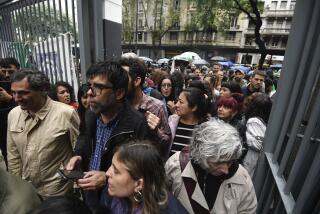Sweeping Economic Reforms Announced : Argentina to Sell State Industries
- Share via
BUENOS AIRES — Promising “growth with stability,” the Argentine government Thursday night announced sweeping structural economic reforms that will include the sale of key government-owned industries to the private sector.
The government will sell Somisa, the country’s largest steelmaking complex, as well as its interests in five of Argentina’s largest petrochemical plants, Economy Minister Juan Sourrouille announced in a nationwide address.
Also, President Raul Alfonsin, in a statement before Sourrouille’s address, said the success so far of his Draconian austerity program, called the Austral Plan, “has exceeded even our own expectations. . . . The Austral Plan today begins its second stage.”
Sourrouille said the six industries he named are not all of those that the government is prepared to sell.
However, the economy minister did not detail the mechanism by which industries would pass to the private sector, saying that the government will outline plans later in a proposal to Congress. Income from the sale will be used to create a fund to foster industrial development, he said.
Thursday’s announcements represented a historic step away from four decades of economic paternalism in which the state became Argentina’s largest entrepreneur. In the process, it usually printed money to finance the huge deficits of featherbedded industries, from airlines to telephone companies.
Continuation of Austerity
The new program pledges a continuation of the austerity inaugurated by the Austral Plan last June to stop inflation, which then was raging at 40% per month. Sourrouille said state enterprises will continue to be forced to pay their own way, helping to reduce the government’s deficit to 2.4% of gross national product, about half the 1985 level.
He said inflation would be held to 2% to 3% per month but promised that the government program would generate 1986 growth of 4%.
“This will be the year of growth with stability. We propose to build on the basis of stability and not at its cost,” Sourrouille said.
But Argentina’s economy is stagnant now and some government critics believe that the growth target is unrealistic.
In addition to the industrial sell-off, the apolitical economic technicians who devised the Austral Plan have won Alfonsin’s backing for a number of other key reforms.
Sourrouille said the government will make credits and developmental funds available to stimulate industrial exports, particularly those from industries employing high technology.
In addition, it will reduce export taxes on agricultural products, which are Argentina’s largest source of foreign exchange. To stimulate the slumping construction industry, the government will step up a low-cost housing program that is largely self-supporting, Sourrouille said.
More to Read
Sign up for Essential California
The most important California stories and recommendations in your inbox every morning.
You may occasionally receive promotional content from the Los Angeles Times.













